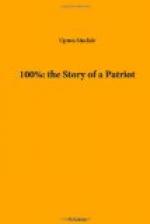Peter couldn’t “get it”; Peter was utterly lost. Could a man go ahead and break the law, just because he happened to be a brother of a United States senator? And what difference did it make whether a thing was in the Declaration of Independence, if it was seditious, if it wasn’t allowed to be said? This incident brought Guffey and the police authorities of the city so much ridicule that Guffey got all his men together and read them a lecture, explaining to them just what were the limits of the anti-Red activities, just who it was they mustn’t arrest, and just what it was they couldn’t keep people from saying. For example, a man couldn’t be arrested for quoting the Bible.
“But Jesus Christ, Guffey,” broke in one of the men, “have all of us got to know the Bible by heart?”
There was a laugh all round. “No,” Guffey admitted, “but at least be careful, and don’t arrest anybody for saying anything that sounds as if it came from the Bible.”
“But hell!” put in another of the men, who happened to be an ex-preacher. “That’ll tie us up tighter than a jail-sentence! Look what’s in the Bible!”
And he proceeded to quote some of the things, and Peter knew that he had never heard any Bolshevik talk more outrageous than that. It made one realize more than ever how complicated was this Red problem; for Guffey insisted, in spite of everything, that every word out of the Bible was immune. “Up in Winnipeg,” said he, “they indicted a clergyman for quoting two passages from the prophet Isaiah, but they couldn’t face it, they had to let the fellow go.” And the same thing was true of the Declaration of Independence; anybody might read it, no matter how seditious it was. And the same thing was true of the Constitution, even tho the part called the Bill of Rights declared that everybody in America might do all the things that Guffey’s office was sending them to jail for doing!




